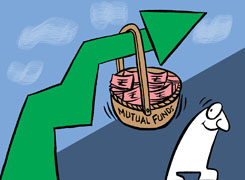Ramalingam Kalirajan |10870 Answers |Ask -Follow
Mutual Funds, Financial Planning Expert - Answered on May 09, 2024
He has an MBA in finance from the University of Madras and is a certified financial planner.
He is the director and chief financial planner at Holistic Investment, a Chennai-based firm that offers financial planning and wealth management advice.... more

Sir, i have been investing in Large cap direct MF , shall i close them and move to largege cap index fund ? Same startegy for mid , small and mirco cap ?
While index funds offer lower expense ratios and passive management, they may not always outperform actively managed funds, especially during market fluctuations or when specific sectors outperform the broader market.
Here's a breakdown of factors to consider:
Large Cap Funds: If your large-cap direct mutual funds have consistently underperformed their benchmark indices, or if you prefer a more passive approach with lower costs, transitioning to large-cap index funds could be an option. However, ensure you understand the implications of switching, including potential tax consequences and performance variations.
Mid, Small, and Micro Cap Funds: These segments of the market often require active management to identify promising opportunities and manage risks effectively. While index funds may provide broad exposure, actively managed funds can capitalize on market inefficiencies and deliver potentially higher returns. Evaluate the track record of your existing funds and consider consulting a Certified Financial Planner to determine the best approach based on your investment goals and risk profile.
When transitioning between funds, consider the following:
Tax Implications: Exiting existing investments may trigger capital gains tax liabilities. Assess the tax implications of switching funds and evaluate whether the potential benefits outweigh the costs.
Performance Comparison: Compare the historical performance of your current funds with relevant index benchmarks. Evaluate factors such as consistency, risk-adjusted returns, and fund manager expertise before making a decision.
Cost Analysis: Consider the impact of expense ratios and transaction costs on your investment returns. While index funds typically have lower costs, ensure that the benefits justify any potential performance trade-offs.
Diversification: Review your overall portfolio diversification and ensure that any changes align with your asset allocation strategy and long-term financial goals.
Ultimately, the decision to switch from actively managed funds to index funds should be based on a thorough assessment of your individual circumstances and investment objectives. Consulting with a Certified Financial Planner can provide valuable insights and personalized guidance tailored to your specific needs.
there are some advantages to consider direct funds, and the cost savings can be significant in the long run. However, there are some potential benefits to using a regular MFD:
Advantages of Investing Through a Mutual Fund Distributor (MFD):
Personalized Advice: MFDs can be helpful for beginners or those who lack investment knowledge. They can assess your risk tolerance, financial goals, and investment horizon to recommend suitable mutual funds. This personalized guidance can be valuable, especially if you're new to investing.
Convenience: MFDs handle all the paperwork and transactions on your behalf, saving you time and effort. They can help with account setup, SIP registrations, and managing your portfolio across different funds.
Investor Support: MFDs can be a point of contact for any questions or concerns you may have about your investments. They can provide ongoing support and guidance throughout your investment journey.
Best Regards,
K. Ramalingam, MBA, CFP,
Chief Financial Planner,
www.holisticinvestment.in
You may like to see similar questions and answers below
Omkeshwar Singh | Answer |Ask -Follow
Head, Rank MF - Answered on Jan 30, 2020
Ulhas Joshi |280 Answers |Ask -Follow
Mutual Fund Expert - Answered on Aug 13, 2024
Ramalingam Kalirajan |10870 Answers |Ask -Follow
Mutual Funds, Financial Planning Expert - Answered on Jan 20, 2025
Ulhas Joshi |280 Answers |Ask -Follow
Mutual Fund Expert - Answered on Dec 05, 2025
Dr Dipankar Dutta |1835 Answers |Ask -Follow
Tech Careers and Skill Development Expert - Answered on Dec 04, 2025
Ravi Mittal |676 Answers |Ask -Follow
Dating, Relationships Expert - Answered on Dec 04, 2025
Anu Krishna |1745 Answers |Ask -Follow
Relationships Expert, Mind Coach - Answered on Dec 04, 2025
Anu Krishna |1745 Answers |Ask -Follow
Relationships Expert, Mind Coach - Answered on Dec 04, 2025
Mayank Chandel |2562 Answers |Ask -Follow
IIT-JEE, NEET-UG, SAT, CLAT, CA, CS Exam Expert - Answered on Dec 04, 2025
Mayank Chandel |2562 Answers |Ask -Follow
IIT-JEE, NEET-UG, SAT, CLAT, CA, CS Exam Expert - Answered on Dec 04, 2025
Mayank Chandel |2562 Answers |Ask -Follow
IIT-JEE, NEET-UG, SAT, CLAT, CA, CS Exam Expert - Answered on Dec 04, 2025
Mayank Chandel |2562 Answers |Ask -Follow
IIT-JEE, NEET-UG, SAT, CLAT, CA, CS Exam Expert - Answered on Dec 04, 2025
Mayank Chandel |2562 Answers |Ask -Follow
IIT-JEE, NEET-UG, SAT, CLAT, CA, CS Exam Expert - Answered on Dec 04, 2025


























